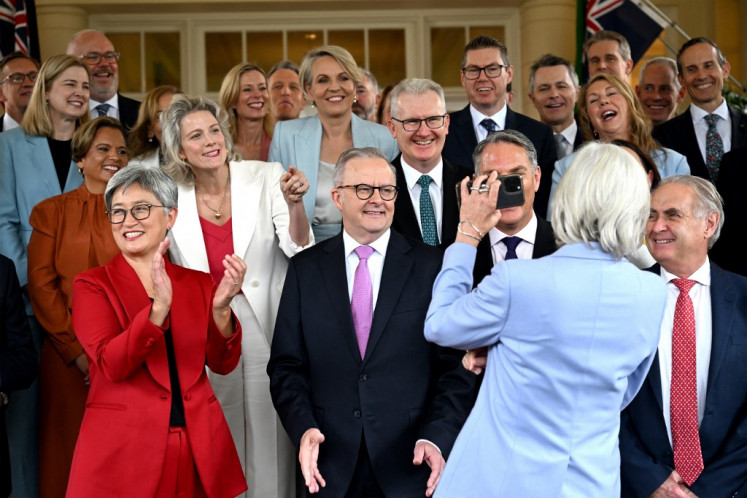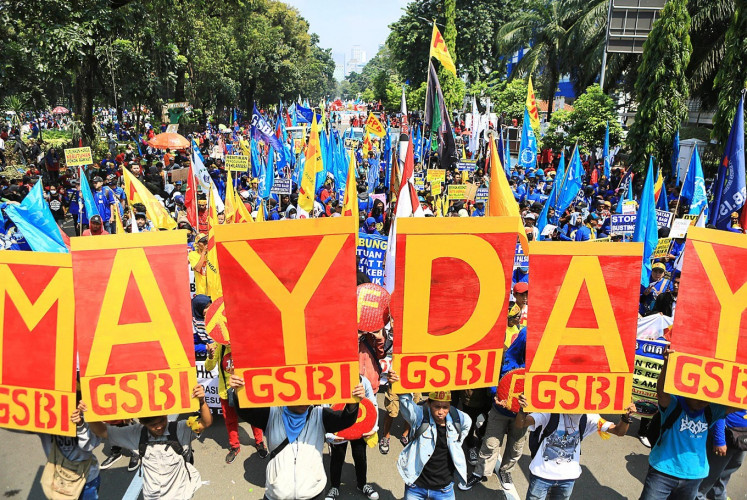News Analysis: Understanding Jokowi's two-step shuffle
Politics is an inimitable dance
Change text size
Gift Premium Articles
to Anyone

P
olitics is an inimitable dance. Swayed to a tune of uncorresponding keys and off-beat rhythms. Those involved must find their own panache, or move to the beat of a different drummer.
To some, President Joko 'Jokowi' Widodo's first Cabinet reshuffle was astoundingly confusing. The objective seemed unclear and the message vague, almost cryptic. The Indonesian market in the afternoon responded in disorientation, in large part pressured more by the contagion of a regional slump than anything else.
But for those who understand the former Surakarta mayor and Jakarta governor well enough, it was a typically pragmatic move nuanced with pragmatic objectives without upsetting the political balance. In the end, he got what he believed he needed.
It was a highly surgical operation. A two-step move: one step forward to achieve immediate objectives and then one step to the side to avoid political landmines.
Better coordination within the Cabinet and a more definitive execution of plans were strong motivating factors for this reshuffle. One may have personal opinions about Luhut B. Pandjaitan, Darmin Nasution and the controversial Rizal Ramli, but the President saw them as men who had strong characters and who were practical doers.
The aim was better management of the Cabinet under a robust supervisory role held by the coordinating ministers. A reprise of the role coordinating ministers had in the Soeharto era.
Jokowi has established and sustained a reputation of being a details man in executing projects. Unlike previous presidents, he takes personal hands-on interests in key ventures and infrastructure projects. Going so far as to personally interject, if need be, in local-level problems.
For example, nearly half a dozen times Jokowi has called in top executives involved in the hold up of the Batang power plant project, which is being delayed because of land issues.
He knows that these projects will be key to his government's legacy, and he himself can no longer continuously micro-manage.
President Susilo Bambang Yu-dhoyono had his presidential working unit for the supervision and management of development. The President seems to want to use his three coordinating ministers the same way.
The reshuffle was also very surgical in sense that it did not upset the fine political balance the President has to juggle. Hence the evolution of the reshuffle went smoothly and without too much cacophony.
The name of Rizal Ramli seemed to cause a degree of consternation in some quarters. But he placated these concerns while satisfying political demands for his appointment by giving him a portfolio that is more internally looking and already has very strong departmental ministers.
The placement of Pramono Anung was also a master stroke. While known as a veteran Indonesian Democratic Party of Struggle (PDI-P) politician, he is also noted for his intellect, understanding of procedures and extensive experience in the House of Representatives.
Not only will he likely be effective as a Cabinet secretary with his substantial interpersonal skills, but he will also become a valuable bridge for Jokowi, the PDI-P and other political parties both in and out of the coalition.
The shuffling of Sofyan Djalil to chair the National Development Planning Board (Bappenas) is a further plus. Experience, a strong political network and an institutional understanding of government are all plus points that can only make Bappenas better. Furthermore, once again, the move did not cause any political friction or imbalance.
What will be interesting is the appointment of Thomas Trikasih Lembong as trade minister.
Thom has been one of those most responsible for helping Jokowi find his economic voice over the past year. And so one can understand a president wanting to appoint someone he is extremely accustomed to.
The appointment of Thomas and Darmin also sent a secondary message to the markets that the President understood their concerns by appointing figures who have a strong local economic background, but could also transition smoothly into an internationalist outlook.
And, again, there was little political cost in the appointment of Thomas and removal of Rachmat Gobel.
All-in-all the Javanese tactician pulled yet another move that was just satisfying enough to endear a degree of hope, while still extracting the best political benefit of consolidation for his young government.
The question after this ingenious two-step: Is the music a coda or a refrain for more changes to come?









